The Checker Maven
The World's Most Widely Read Checkers and Draughts Publication
Bob Newell, Editor-in-Chief
Published every Saturday morning in Honolulu, Hawai`i
Noticing missing images? An explanation is here.
Double Crossing

A very complex-looking double crossing is to be found in the model railway section pictured above. We wonder, though, if it's equal in complexity to today's checker problem, which, most appropriately, arises in a line of the Double Cross opening. The Double Cross, arising from 9-14 23-18, has a bit of shall we say a checkered reputation, with 23-18 being at best a weak reply to 9-14. Nevertheless, it's completely playable if you know what you're doing, but there's plenty of opportunity to go astray.
But for now, let's jump right into our position, in which White has indeed strayed from the narrow path.
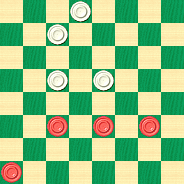
BLACK
Black to Play and Win
B:W31,27,19,18:B11,10,9,4.
Can you find the Black win, or will you get all crossed up? Don't be cross about it; clicking on Read More brings you the solution, the run-up to the position, and the usual explanatory notes.![]()
Ferrie's Flourish

Fed by the clear, clean moisture of the beautiful waterfall shown above, flora in the area will certainly flourish. But in today's entry from Willie Ryan's Tricks Traps & Shots of the Checkerboard we dwell on a different meaning of the word flourish, a checkeristic version which Mr. Ryan credits to James Ferrie. Here's Willie to tell us all about it.
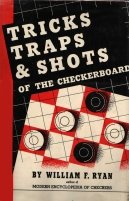
"This time we'll look a a common mid-game trap by Worlds' Champion James Ferrie. This trap has been the stumbling block to more than a few great players. The situation reached at the diagrammed stage may be brought up in play from more than a dozen openings, and hence its practical value cannot be overemphasized. Now turn to the next page and let's examine a pretty coup by one of the old masters.
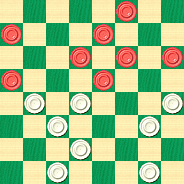
WHITE
White to Play and Win
W:W17,18,20,22,24,26,30,32:B3,5,7,10,11,12,13,15.
| 11-15 | 4- 8 | 9-13 |
| 23-18 | 25-22 | 23-18 |
| 9-14 | 8-11 | 14-23 |
| 18-11 | 27-23 | 27-18 |
| 8-15 | 11-15 | 2-7 |
| 22-18 | 31-27 | 21-17 |
| 15-22 | 7-11 | 1-5---A, 2, |
| 25-9 | 24-20 | reaching the |
| 5-14 | 6-9 | diagrammed |
| 29-25 | 28-24 | position. |
A---No draw after this. The only move is 1-6*, 26-23 (18-14, 15-18, black wins), 6-9, 32-28, 10-14, 17-10, 7-14, 24-19, 15-24, 28-19,14-17, 30-26, 17-21, 19-15, 3-8,15-10, 21-25,10-6, 25-30, 6-1, 9-14*---B, 18-9, 11-15, 1-6, 15-19, 23-16, 12-19; a draw. Wm. F. Ryan.
2---The game is still in computer book play, with 1-6 indeed being the move to draw at this point. Other plausible looking moves such as 12-16 also lose, for instance 12-16 26-23 3-8 32-28 8-12 24-19 15x24 28x19 1-5 18-14 and Black is finished.---Ed.
B---Should black bring out his king 30-25, white scores with this surprise: 30-25, 18-15!, 11-27, 1-5, 25-18, 5-32, 8-11---C, 32-27, 11-15---D, 27-31, 13-17, 26-22; white wins by First Position.
C---13-17, 32-27, 17-21, 27-23*, 21-25, 26-22, 25-30, 22-17, 30-25, 17-14, 8-11, 23-18, and white wins.
D---13-17, 27-23, 12-16 (11-15, 26-22 wins), 23-18, 16-19, 18-23, 19-24, 23-18, 24-27, 26-23, 27-31, 23-19, and white wins."
Would you flourish in this situation? Look for the solution, but don't wither; the refreshing solution can be reached by simply clicking on Read More.![]()
Sixth Position
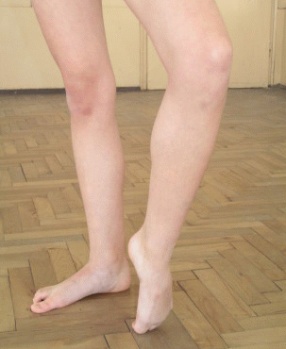
Yes, there is in fact a Sixth Position in classical ballet, going literally a step beyond the five positions known to the typical neophyte ballet student, and it's being demonstrated by our ballerina in the photo above.
In a previous Checker School installment about Second Position, we made a similar analogy to dance arts, and in making a like analogy with Sixth Position, we are just as certain as we were in our earlier installment that both ballet's standard positions and checkers' standard positions are quite unfamiliar (to say the least) to the general public.
But we would certainly never dare to lump in our loyal Checker Maven readers with the general public, so we are sure that many of you have at least some familiarity with the Sixth Position of checkers; and today, we challenge you to either demonstrate your mastery, review or relearn an old lesson, or gain new checker knowledge, all depending upon where you currently stand on the scale of checker erudition.
Here, then, is the classic Sixth Position.
A. MACKINTOSH
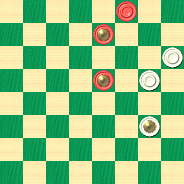
Black Plays, White Draws
B:W12,16,K24:B3,K7,K15.
Demonstrate how it's done, and when you've finished, click on Read More for the solution, sample games, and detailed notes.![]()
Faster, Cheaper, Better
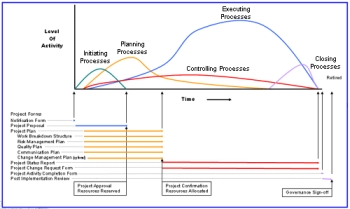
There's an old maxim well known in formal project management practice: "Faster - Cheaper - Better: Choose two." Or, in the words of that yesteryear Cambridge, Massachusetts salesman known simply as Cheap Al: "You can't have all the goodies for nothing."
This month's speed problem indeed calls upon two of the three attributes mentioned in our title, namely, faster and better. Although the problem is quite easy, you'll need to be fast and rather a better player to solve this one within the very brief allowed time. Of course, "cheaper" doesn't enter into the picture as The Checker Maven always has been and always will be a free publication. Sorry Al, but maybe you can have all the goodies for nothing!
Click on the link below to show our problem and start the unforgiving JavaScript clock.
March Speed Problem (very easy)
When you're done, clicking on Read More gives you a faster, cheaper, and better way to see the correct solution.![]()
Head's Redeemer
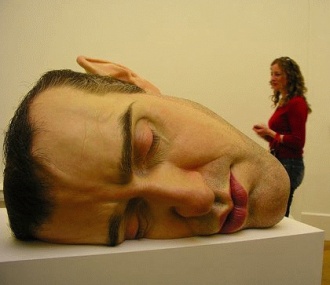
It seems that Mr. Lucius S. Head (whose visage, by the way, is certainly not shown in the picture above) is better known to us than to Mr. Ryan, as we know that he (Mr. Head) was once a resident of Chicago and played many games with old-time Windy City checker expert and somewhat controversial author John T. Denvir. Mr. Head also resided at one time in Minneapolis, Minnesota, and was Minnesota state champion. But such details notwithstanding, in this month's installment from Willie Ryan's Tricks Traps & Shots of the Checkerboard, we see an interesting and practical situation which Mr. Ryan attributes to Mr. Head. Here's Willie to tell us more.

"L. S. Head, of Albany, New York, American member of the 1905 International Checker Team, was a modest soul whose name rarely appeared in checker periodicals of his day. Yet he was a distinguished and widely respected player, as well as an accomplished analyst. Among the few notable items credited to his name is the practical position treated here, known as "Head's Draw," which keeps popping up in play every now and then.
| 10-15 | 6-10 | 1-5*---1 |
| 23-18 | 25-22 | 22-17 |
| 11-16 | 9-14 | 5-9*---2 |
| 18-11 | 18-9 | 17-13 |
| 8-15 | 5-14 | 15-18* |
| 22-18 | 27-23 | 13-6 |
| 15-22 | 8-11 | 2-9 |
| 25-18 | 19-16 | 30-25 |
| 16-20 | 12-19 | 9-13 |
| 29-25 | 23-16 | 26-22---A |
| 4-8 | 11-15 | 10-15 |
| 24-19 | 32-27 | 28-24 |
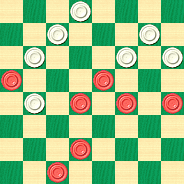
BLACK
Black to Play and Draw
B:W31,27,25,24,22,21,16:B20,18,15,14,13,7,3.
A---If 26-23, 10-15 are played, 23-19 insures a draw; but if 28-24 is used, black shoots the works with: 15-19, 24-15, 20-24, 27-20, 18-27, 31-24, 7-11, and black wins by capturing the piece on 25."
1---Despite the star here, KingsRow gives 1-6 to draw as well---Ed.
2---Again despite the star, KingsRow gives 15-18 to draw also---Ed.
Can you use your head and solve this one? Noodle on it for a while then head over to the solution by clicking on Read More.![]()
Grant vs. M'Guire
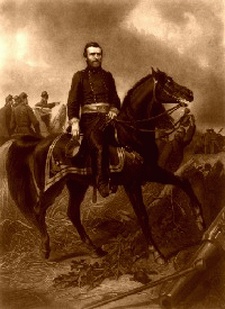
General Ulysses S. Grant
Everyone knows about the great American general Ulysses S. Grant, who fought on the side of the Union in the American Civil War. However, we can find no record of a Confederate general named M'Guire or McGuire. The only reference our research department was able to uncover was of a physician, Dr. Hunter Holmes McGuire, who served with the Confederate army and who was in fact present at the famed Battle of Gettysburg. However we can't find any indication that Dr. McGuire's unit ever faced any of General Grant's units in combat, and we're even more certain that they never met in person over the checkerboard. General Grant went on to be President of the United States, and Dr. McGuire went on to become a contributor to the first of the Geneva Conventions.

Dr. Hunter Holmes McGuire
Today's Checker School position, which is taken from an actual game between someone named Grant and someone named M'Guire, certainly didn't involve the two Civil War personages mentioned above; and the game actually took place in 1893, some 28 years after the end of the War Between the States. It's a small "set piece" battle which is of considerable practical interest.
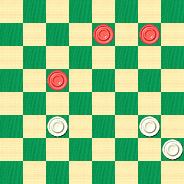
WHITE
Black to Play, White to Draw
B:W22,24,28:B7,8,14.
Can you align the troops such that the Black and White armies fight to a draw? Sound the bugles and beat the drums, then work out the solution before clicking on Read More to charge over to the solution, a sample game, and notes.![]()
Valentine's Day Celebration
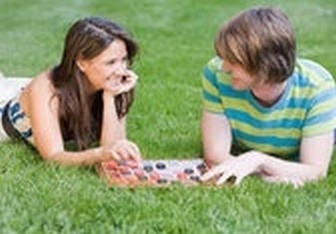
Valentine's Day is the traditional day of romance, yet we are certain that our game of checkers and romance are seldom associated. More's the pity, as we can see in the photo of the young folks just above, and the wonderful picture of the older folks just below.

We like to think that checkers can be an important part of a romantic relationship. Consider: checkers is good clean fun; it's sociable; and it's an inexpensive activity. It's one of the overlooked simple things that can add a lot to a couple's time together.
To celebrate Valentine's Day, here's a checker problem that is of moderate difficulty; we propose that it's just the right thing for you and your Significant Other to work on during a pleasant hour together, perhaps over a soda or a pot of tea. And who knows where it all might lead?

BLACK
Black to Play and Win
B:W25,22,21,20,K3:BK31,14,13,10,2.
Put your heart into finding the answer, then click on Read More for the charming solution.![]()
Winter Speedster

Here in much of North America we're mired in the depths of winter, but that doesn't seem to faze our speed skater in the picture above. He's having a great time out on the ice, making the most of the season.
At home, there's nothing like a checker problem to help us make the most of the season too, and this month we bring you an easy speed problem that will cheer you, even if it won't quite last through a whole cup of tea. In fact, it's easy enough that we think 10 seconds is plenty of time.
When you're ready, click on the link below and speed to your solution. After you're done, click on Read More to check your answer.
February Speed Problem (easy)
![]()
Marvin Returns to St. Louis

Marvin J. Mavin was back in St. Louis on a good-will tour, working in the inner-city schools with disadvantaged children. It was one of his favorite charitable activities and Marvin took every opportunity to further this cause.

But there were other items on Marvin's agenda for this visit. Marvin was scheduled to play an exhibition game at the St. Louis Civic Society Auditorium against the countywide amateur champion, Hinkley B. Dinkley. It was rumored that a number of major league scouts would be in attendance, with their eyes on Mr. Dinkley, who had made such a showing in amateur play that a professional contract was a real possibility. Mr. Dinkley, however, was also considering becoming a tennis pro; tennis seemed to be his real love, even though a major league checker career would be far more lucrative.

It seems, however, that prior to the game, Marvin made an unscheduled and rather prolonged stop--- at St. Louis' landmark Mudvisor Brewery. The press was not allowed to follow Marvin while he took a tour of the brewery, a tour that normally lasts about 30 minutes, though Marvin was not seen to exit the grounds until more than two hours had elapsed. Just what was Marvin doing during all of that time?
But now, Marvin and Hinkley were seated before the checkerboard, shaking hands and exchanging pre-game greetings.
"Ever been to the Mudvisor Brewery, Hink?" asked Marvin.
"Um, the name's Hinkley, and yes, I've been there once or twice. Nothing really special," replied Hinkley.
"Aw, c'mon Hink," Marvin continued, rather oblivious to Hinkley's reply, "they got that Mud Light in there and they give ya samples. Lotsa samples!"
Hinkley declined to reply, as the referee had signaled the start of play. Marvin had Black, and made his opening move.
| 1. | 9-13 |
Marvin leaned back in his chair, clasped his hands on the back of his neck, and chuckled, "Hey, Hink, thought I'd sorta give you a break, being as how you're an amateur and all!"
Hinkley did not reply but simply moved
| 1. | ... | 22-18 |
"Ah, now we're gettin' serious," said Marvin, and the game continued as follows.
| 2. | 12-16 | 24-20 |
| 3. | 8-12 | 25-22 |
| 4. | 16-19 |
Hinkley suddenly sat up straight, staring intently at the board, with an astonished look on his face. He blinked his eyes, blinked again, and continued to stare at the pieces.
"Whaddya lookin....." Marvin started to say, but he abruptly cut off his sentence, and then muttered, "Uh-oh...."
The forced exchanges took place, and then it was again Hinkley's turn.
| 4. | ... | 23-16 |
| 5. | 12-19 |
Hinkley thought for a few more minutes, and then looked Marvin straight in the eye and said, "Marvin, I think your visit to Mudvisor was ill advised," whereupon, Hinkley made his move.
Can you figure out what's going on here? Did Marvin make an error? What move had Hinkley been expecting Marvin to make? How did Hinkley respond?
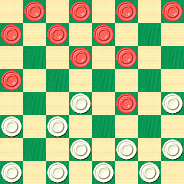
WHITE
White to Play, What Result?
W:W32,31,30,29,28,27,26,22,21,20,18:B19,13,11,10,7,6,5,4,3,2,1.
Put yourself in Hinkley's shoes and work this all out, then click on Read More for the rest of the story.![]()
Have It Your Way
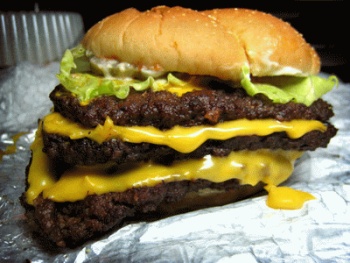
We certainly don't recommend that you consume the entire triple burger shown above in a single sitting, unless you're hungry beyond belief and health considerations are of no consequence. Instead, we recommend you try out today's triple checker problem, in which you can truly have it your way.
The first setting is this.
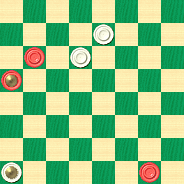
BLACK
Black to Play and Win
B:W26,23,K4:B24,K20,1.
If you don't like the first setting, then move the Black piece on square 1 over to square 2.
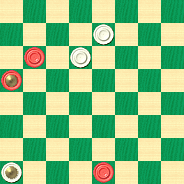
BLACK
Black to Play and Win
B:W26,23,K4:B24,K20,2.
And if even that doesn't please you, move the piece to square 3 instead.
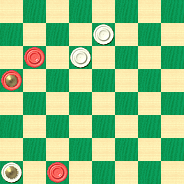
BLACK
Black to Play and Win
B:W26,23,K4:B24,K20,3.
Have it your way--- move the Black piece to any one of the three squares as shown--- and Black will still win. Can you find the correct play in all of the positions?
Try to solve them; they're really not so difficult (well, mostly). Then after you've had it your way, have it our way by clicking on Read More to check your answers.![]()
The Checker Maven is produced at editorial offices in Honolulu, Hawai`i, as a completely non-commercial public service from which no income is obtained or sought. Original material is Copyright © 2004-2026 Avi Gobbler Publishing. Other material is public domain, AI generated, as attributed, or licensed under CC1, CC2, CC3 or CC4. Information presented on this site is offered as-is, at no cost, and bears no express or implied warranty as to accuracy or usability. You agree that you use such information entirely at your own risk. No liabilities of any kind under any legal theory whatsoever are accepted. The Checker Maven is dedicated to the memory of Mr. Bob Newell, Sr.

